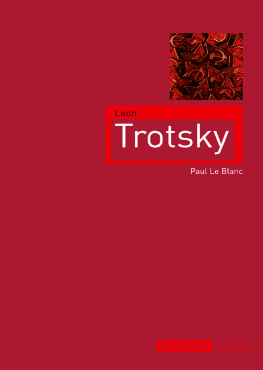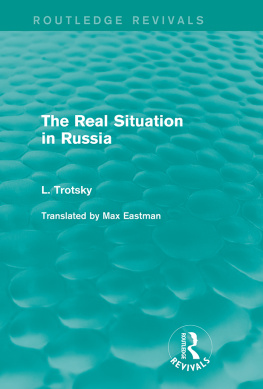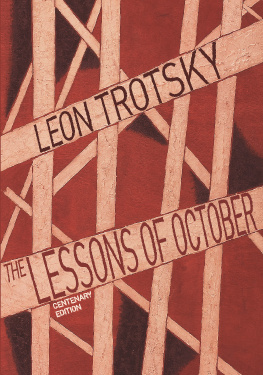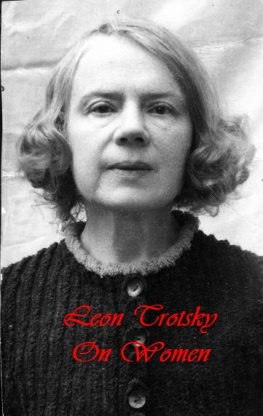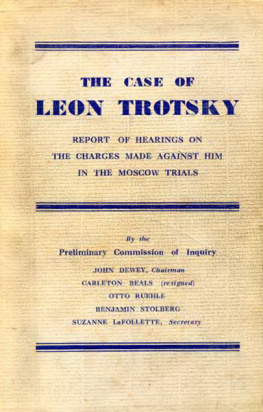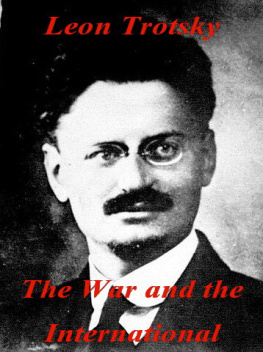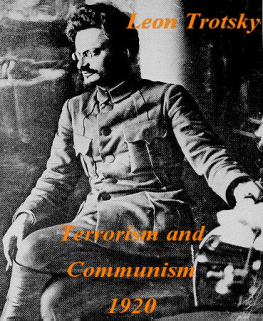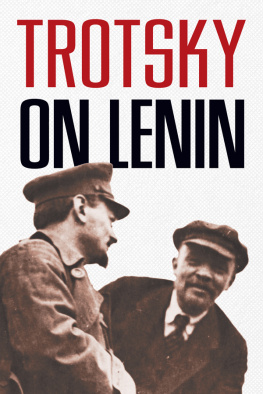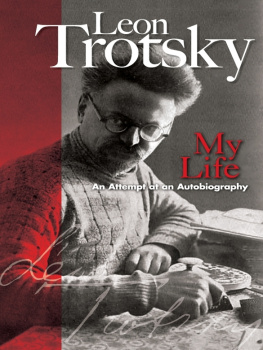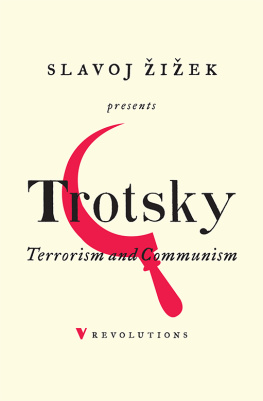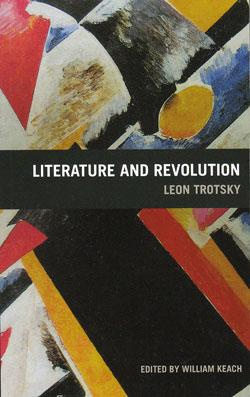Leon Trotsky

Titles in the series Critical Lives present the work of leading cultural figures of the modern period. Each book explores the life of the artist, writer, philosopher or architect in question and relates it to their major works.
In the same series
Georges Bataille Stuart Kendall | Franz Kafka Sander L. Gilman |
Charles Baudelaire Rosemary Lloyd | Frida Kahlo Gannit Ankori |
Simone de Beauvoir Ursula Tidd | Yves Klein Nuit Banai |
Samuel Beckett Andrew Gibson | Akira Kurosawa Peter Wild |
Walter Benjamin Esther Leslie | Lenin Lars T. Lih |
John Berger Andy Merrifield | Stphane Mallarm Roger Pearson |
Jorge Luis Borges Jason Wilson | Gabriel Garca Mrquez Stephen M. Hart |
Constantin Brancusi Sanda Miller | Karl Marx Paul Thomas |
Bertolt Brecht Philip Glahn | Henry Miller David Stephen Calonne |
Charles Bukowski David Stephen Calonne | Yukio Mishima Damian Flanagan |
William S. Burroughs Phil Baker | Eadweard Muybridge Marta Braun |
John Cage Rob Haskins | Vladimir Nabokov Barbara Wyllie |
Fidel Castro Nick Caistor | Georgia OKeeffe Nancy J. Scott |
Coco Chanel Linda Simon | Pablo Neruda Dominic Moran |
Noam Chomsky Wolfgang B. Sperlich | Octavio Paz Nick Caistor |
Jean Cocteau James S. Williams | Pablo Picasso Mary Ann Caws |
Salvador Dal Mary Ann Caws | Edgar Allan Poe Kevin J. Hayes |
Guy Debord Andy Merrifield | Ezra Pound Alec Marsh |
Claude Debussy David J. Code | Marcel Proust Adam Watt |
Fyodor Dostoevsky Robert Bird | John Ruskin Andrew Ballantyne |
Marcel Duchamp Caroline Cros | Jean-Paul Sartre Andrew Leak |
Sergei Eisenstein Mike OMahony | Erik Satie Mary E. Davis |
Michel Foucault David Macey | Arthur Schopenhauer Peter B. Lewis |
Mahatma Gandhi Douglas Allen | Susan Sontag Jerome Boyd Maunsell |
Jean Genet Stephen Barber | Gertrude Stein Lucy Daniel |
Allen Ginsberg Steve Finbow | Leon Trotsky Paul Le Blanc |
Derek Jarman Michael Charlesworth | Richard Wagner Raymond Furness |
Alfred Jarry Jill Fell | Simone Weil Palle Yourgrau |
James Joyce Andrew Gibson | Ludwig Wittgenstein Edward Kanterian |
Carl Jung Paul Bishop | Frank Lloyd Wright Robert McCarter |
Leon Trotsky
Paul Le Blanc
REAKTION BOOKS
This book is dedicated
to the memory of George Breitman
Published by Reaktion Books Ltd
33 Great Sutton Street
London EC1V 0DX, UK
www.reaktionbooks.co.uk
First published 2015
Copyright Paul Le Blanc 2015
All rights reserved
No part of this publication may be reproduced, stored in a retrieval system, or transmitted, in any form or by any means, electronic, mechanical, photocopying, recording or otherwise, without the prior permission of the publishers.
Page references in the Photo Acknowledgements and
Index match the printed edition of this book.
Printed and bound in Great Britain
by Bell & Bain, Glasgow
A catalogue record for this book is available from the British Library
eISBN: 9781780234717
Contents
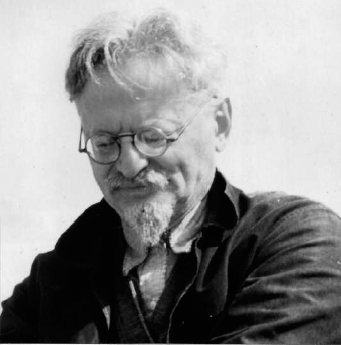
Introducing a Life
A son of a bitch, but the greatest Jew since Jesus Christ is how Trotsky was described by Raymond Robins, a Teddy Roosevelt Progressive and representative of the American Red Cross in Petrograd. It was late 1917, shortly after the Bolshevik Revolution in Russia inaugurated the birth of modern Communism. Robins was involved in frustrating, fascinating negotiations with Trotsky, who was second only to Vladimir Ilyich Lenin among Russias revolutionary Marxist leaders.
The actual name of the man was Lev Davidovich Bronstein, but most of the world has known him by his revolutionary nom de plume. Twenty-three years later, an agent of the Communist regime that Trotsky had helped to establish would plunge an alpine ice axe into his head. The assassin after serving a twenty-year prison sentence in Mexico travelled to the Union of Soviet Socialist Republics and was awarded the Order of Lenin.
Since his martyrdom in 1940, it can be said that Trotsky has experienced an ongoing resurrection, with well over a dozen biographies and continuing publication of his major writings. Restricting ourselves to the English language, in the past two decades no fewer than ten book-length studies of Trotskys life and ideas have appeared. If we include studies in which he and his ideas figure prominently, plus novels, songs, poems, plays and both documentary and non-documentary films, then there is the equivalent of a significant work every six months, reflecting the impact he had on the history of the twentieth century, which continues to reverberate down to our own time.
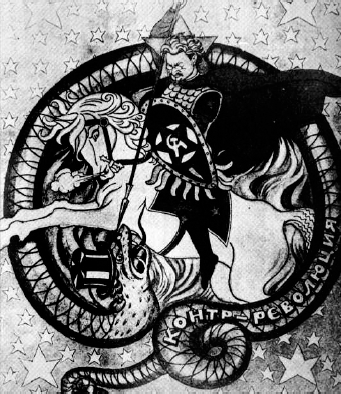
A Russian Civil War poster by Victor Deni, with Trotsky as a revolutionary St George, slaying the dragon of capitalism.
For millions of people throughout the world, Leon Trotsky was initially seen as a revolutionary liberator. Bertrand Patenaude, one of the more careful critics among his recent biographers, notes that Trotsky winning over vast crowds of workers, soldiers, and sailors in Petrograd with his spellbinding oratory in 1917 proved to be Lenins most important ally when the Bolsheviks stormed to
He elaborated on this to a radical journalist from the United States, John Reed, in an interview just before the Bolshevik insurrection. The Bolshevik slogan was all power to the Soviets, the democratic councils that had sprung up in the revolutionary upsurges of 1905 and again in 1917. The Soviets are the most perfect representatives of the people perfect in their revolutionary experience, in their ideas and objects, Trotsky explained. Based directly upon the army in the trenches, the workers in the factories, and the peasants in the fields, they are the backbone of the Revolution.
Locating the Person
In Trotsky: A Graphic Biography, Rick Geary summarizes the story in the first four frames:
In 1917, Leon Trotsky burst upon the international stage as the brain behind the Russian Revolution. He presided over the complete transformation of his country, not merely a change of government but a total restructuring of society on every level. To many, he was the heroic St George, slaying the dragon of capitalist repression. To others, he was the ruthless and Satanic purveyor of bloody rebellion, the cold, detached theorist gone mad with power. In truth, he fitted neither of these images. He was a writer, a thinker, a nation-builder albeit a reluctant one with deep roots in his Russias agricultural heartland. Trotskys dream was for a world free from injustice, inequality,

